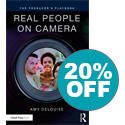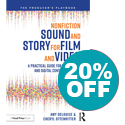Public Speaking Tips
We creatives have unique challenges for public speaking. We must continually present and pitch our work as part of the production process. In addition, freelance and small business creatives need to increase visibility to promote our work, which means grabbing thought leadership opportunities to speak on stages and present at conferences and events. I don’t know about you, but for me, public speaking is a skill I’ve had to develop over many years. I’m lucky enough to have some musical theater in my background (jazz hands!), but that’s not entirely like keynoting in a room filled with hundreds of strangers. Or presenting a creative concept to a group of clients. And these days I’m also teaching video courses on LinkedIn Learning, hosting livestreamed webinars, and “presenting” to camera on Zoom almost every day. So if you are like me and your focus is on your creative work, and if you happen to be an introvert, all of this public speaking can be a challenge. So I’ve pulled together a few tips that I hope can be helpful.
A Few Speaking Best Practices
This might seem obvious, but wear something that gives you confidence. Stand (or sit) up straight. Speak with conviction–not too loud, but not too softly. If presenting online, invest in a good microphone. (See my blog post on web audio for suggestions.) Smile! Try to enjoy yourself, even if public speaking isn’t your thing. Because the audience can sense when you are miserable, and that can affect how they hear–or don’t–what you have to say. Try not to be thrown off by questions. If someone really throws you a curveball, be willing to say “I can’t answer that right now but I’ll be happy to email you after this event.”
Pitching Creative Concepts
When presenting to clients or prospective clients, I try to be sure to spend plenty of time listening. That can be hard, since I’m usually very excited about the ideas my team and I are presenting. But don’t fill every pause. Let your audience absorb your ideas and visual concepts at their own pace. Let them ask questions. Don’t get defensive (this one is SO hard). Take copious notes instead and offer to revert back with additional ideas if needed. One thing I like to do when pitching creative is to ask these two questions: “What about this idea is really exciting to you?” and also “What about this idea makes you nervous?” That last question can put people at ease that you are willing to problem-solve when getting to a shared decision about the creative direction for this project.
Presenting at Conferences, Webinars and Live Events
I’ve made literally hundreds of presentations at live and virtual events, and I can say there are just two really big takeaways to remember. First, know your audience. It’s not enough to know your subject. You want to understand where the audience is coming from, what they are likely to want to learn, and what level of detail might be best reserved for additional materials they can find from you later. The second tip is give examples. Theoretical information is fine, but real world examples always make an impression on an audience. If you can back those up with behind-the-scenes video or photos, even better.
Being Interviewed: Strategies for Panels and Podcasts
As someone who interviews people for a living for video productions, I always do my homework. I need to learn about the person and their interests as well as the stories they are likely to tell. However, being on the flip side, interviewers don’t always take their time to do background research. So you need to come prepared with several different stories and examples, and have a good sense of the audience for this panel or podcast. If you’re on a panel, hopefully your host has already had a preliminary call with you and the other panelists to map out who will talk about what. If not, take it upon yourself to do this, or at least cover the possible topics in an email. You don’t want someone to steal your thunder, nor do you want to do the same. So it’s best to have some sense of the flow in advance.
I hope these tips are helpful, and that you get a chance to do more public speaking, and better yet, to enjoy it!
Amy DeLouise is a video producer, trainer, author and speaker. You can find out where she’s speaking next here: https://www.amydelouise.com/speaking/






Leave a Reply
Want to join the discussion?Feel free to contribute!